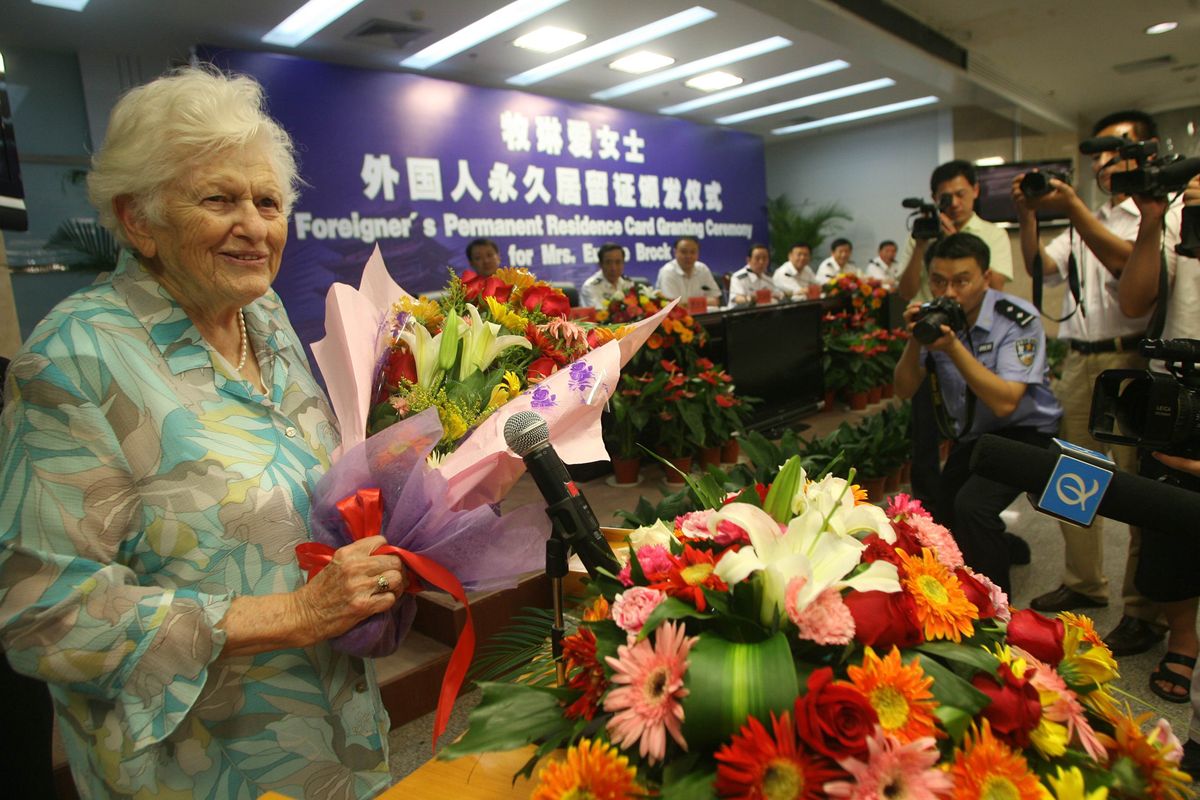Brock’s helping hand reached across the globe

Eunice Moe Brock was an American woman who carried her passion for helping people across oceans, continents and decades. In a recent visit to Spokane, a group of people from a city in China carried it on.
A delegation from China intent on creating a palliative care program at a hospital renamed for Brock in Liaocheng, on China’s western edge, toured the palliative program at Providence Sacred Heart Medical Center in hopes of learning about end-of-life care options.
Palliative care professionals specialize in the relief of the pain, symptoms and stress of serious illness. The care of terminally ill children and adults was chief among Brock’s interests, said her daughter, Dr. Sylvia Brock, a Chewelah resident who asked Sacred Heart to help organize the visit.
And Eunice Brock was a woman who pursued her interests – even if she was 82 when she finally moved to China to help her new neighbors however she could, leaving a legacy that will be honored at the hospital, a charitable foundation and other efforts to help the Chinese people.
“She was interested in health, she was interested in education, she was interested in women’s rights,” Sylvia Brock said. “And she was outspoken, always.”
Born in China to missionary parents and raised there until she was 13, Eunice Brock never stopped planning to return, even as her husband’s career as a minister and her own as a nurse took their family around the U.S. instead.
When Brock finally did go back to China, in 1999 after her husband’s death in Oregon, she stayed for good. She was 95 when she died in April.
In her last 14 years, Eunice Brock lived humbly. In search of “someplace in China where she could be of help,” Sylvia Brock said, her mother landed in a small village called Liumiao. She helped teachers improve their English, kept her home open to children to play and villagers to visit, “planted flowers everywhere,” and provided health care in the small ways she could – arranging for an optometrist to visit the village, helping to secure glasses for those who needed them.
As her physical energy declined, Eunice Brock later moved to the city of Liaocheng, where she’d spent much of her early childhood, witnessing violence among warlords and a years-long famine. While there are few nursing homes in China, Eunice Brock traveled to visit nursing home residents in another city.
Eunice Brock’s small-scale efforts attracted attention on a large scale. She appeared on state-owned Chinese TV and in national newspaper articles about her contributions to her communities. People who’d seen the coverage would show up at her mother’s door to meet her, Sylvia Brock said, and she’d welcome them.
“I have a Chinese heart,” Eunice Brock told Chinese reporters.
Part of her mother’s appeal was novelty, Sylvia Brock said: She was an elderly woman who sold her belongings and left the U.S. for a rural life “among the people,” with few amenities. The city she moved to was home to 6 million people, but it was off the tourist route and had no airport, Brock said. Its residents rarely encounter Americans.
But in her interactions in China during her visits to her mother and with the group who visited Spokane, another theme kept emerging, Sylvia Brock said. Those who’d befriended her mother kept saying that she’d shown, by example, how to care well for others.
“That spirit of love that she somehow emanated was what people talk about, what they’re holding on to,” Sylvia Brock said.
That legacy extended to Spokane late last month, as the five delegates from China – a doctor, the hospital’s owner and builder and others – toured the palliative care programs at Sacred Heart.
Dr. Lisa Stiller, medical director of the hospital’s palliative care program, guided much of the tour, which covered the Center for Faith and Healing, the children’s cancer unit, St. Joseph Care Center and other options.
She said the group from China was trying to add comfort and “whole-person care” components to end-of-life care in an otherwise “doctor-directed” medical culture.
The group seemed impressed by the technology they saw, Stiller said – which they wouldn’t be able to pay for, they told their hosts.
“Part of our message back to them was that truly, when people are needing comfort … at the end of life, it’s not just about giving fancy technology,” Stiller said. “It’s about caring for the whole person and treating them spiritually, emotionally and physically.”